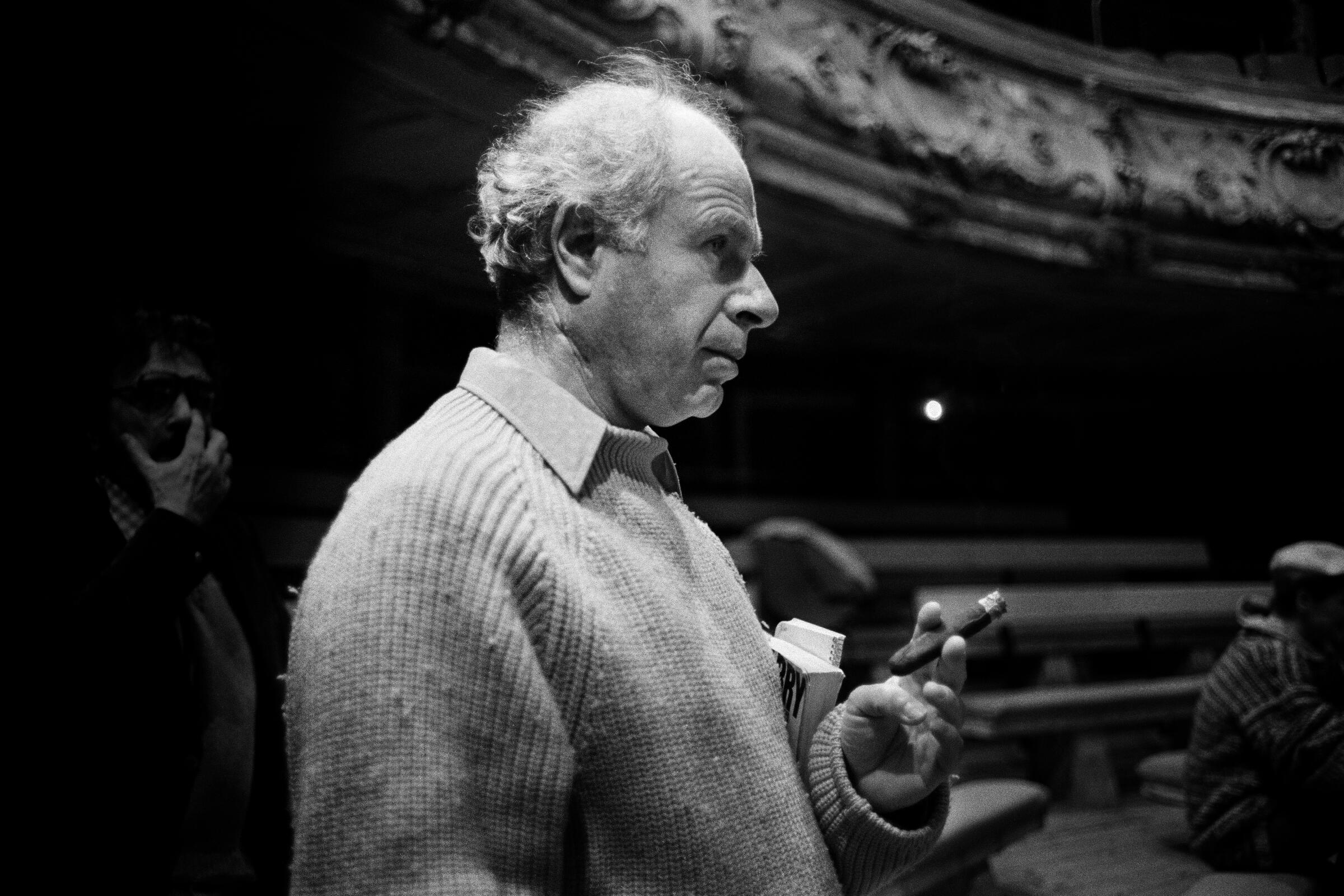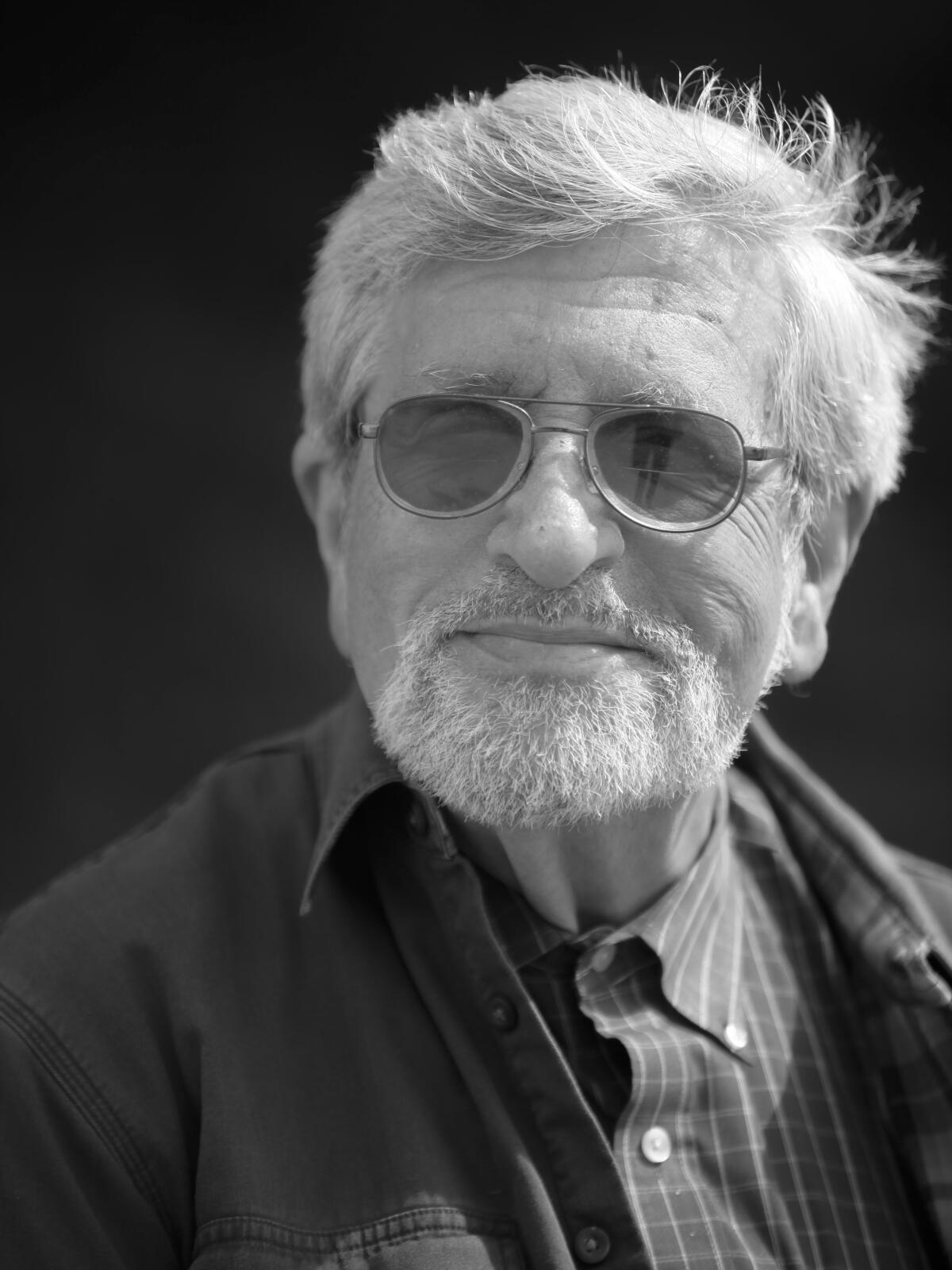The biggest entertainment stories
Get our big stories about Hollywood, film, television, music, arts, culture and more right in your inbox as soon as they publish.
You may occasionally receive promotional content from the Los Angeles Times.

Director Peter Brook and musicologist Richard Taruskin were transformative figures, and fixtures, in their fields. While alive they were too unalike — separated by age, temperament and activities — to tempt us to connect them in any way. Yet their deaths a day apart at the beginning of July placed their obituaries and appreciations on the same weekend cultural news cycle. Chance, ever the illuminator, brought them together.
On the surface, they occupied opposite ends of the intellectual and philosophical spectra. One came across as a quiet, reserved, eloquent, thoughtful force of nature; the other as a boisterous, querulous, troublemaking and sometimes thoughtless and mean force of nature. One was a tidy, careful and empty-space minimalist; the other, a voracious maximalist, with something (a lot) to say about everything and ever ready with a cutting repartee.
That, anyway, was the public image each cultivated. Brook was far better known to the general public, especially for his Broadway successes and films. In his old age, he acquired a reputation as a wise, mystic elder of theater. For an academic whose subject was historic musicology, Taruskin made a considerable splash as a public intellectual who published extensively in the New York Times, the New Republic and elsewhere. He too was sage-like, however feistily so, in his later years, an éminence grise who in 2017 was awarded the Kyoto Prize, the closest a musicologist can get to a Nobel. They held court in different realms and were products of their different generations. Brook died at 97, Taruskin at 77.
The great irony about Brook and Taruskin, and one thing that profoundly joins them, is that, while neither was quite what he seemed on the surface, each was possessed by the need to dig under surfaces. Each was an exposer extraordinaire: in Taruskin’s case, a composer like Stravinsky; in Brook’s case, an opera character like Don Giovanni. It was always the bigger picture they were after, art being a process through which we might better understand ourselves and society. Taruskin revolutionized musicology by placing all music in social context. Brook felt the same need for theater.
Taruskin claimed again and again, with an academic’s powerful surety, that he had found answers. Brook loved to declaim that he had no answers, because there are no answers. Brook’s surety, of course, was the same as Taruskin’s but in a mystic’s clothing.
In this, both were exceptional showmen who came from similar roots and cosmopolitan backgrounds. Brook grew up in London, the son of Russian Jewish emigrants. Taruskin grew up in New York, the grandson of similar emigrants. “Russian” is how many emigrants of the time identified, regardless of where they came from in the Eastern European Russian empire.
Russia played a crucial role in them both developing world views. Although Taruskin was a notable scholar of early music, he also specialized in Russian music and wrote the most impressive study of Stravinsky to date. Part of Brook’s family remained in Russia. His cousin, Valentin Pluchek, worked in Moscow with the famed Russian dissident director Vsevolod Meyerhold, who was an influence on Brook. Brook didn’t mount much Russian theater but his 1988 production of Chekhov’s “The Cherry Orchard” at the Brooklyn Academy of Music has always been for me the one to beat.
Music, moreover, played an important role in both their early educations. Both entered into performance in college. In Brook’s case, at Oxford University, it was directing theater. Taruskin performed as a violist and choral conductor who specialized in early music while studying at Columbia University.

Taruskin and Brook went about their business in their own particular and peculiar ways, each in his own time. But the great questions they asked were often the same. Brook was merely the yin and Taruskin the yang of a shared cosmology.
In my own experience, I have never encountered a pair of art-world tricksters at once so outrageous, so infuriating and so magnificent. Both Brook and Taruskin made me very uneasy with their intimidating posturing. Both drove me up the wall with their preposterous egos. Even so, both left me in awe of their brilliance and, to my surprise with two larger-than-life theatrical figures I initially distrusted, their humanity.
Distrust doesn’t go far enough. I despised each of them at first. Brook’s unsuccessful attempts in the 1950s to get the opera world to take theater seriously were before my time. But seeing his 1967 film “Marat/Sade” and his 1970 “A Midsummer’s Night Dream” onstage — two of Brook’s most famous and influential productions — sufficed to make me anti-Brook. At a time when my rigidly avant-garde aesthetics were being shaped by the likes of John Cage and Merce Cunningham, Robert Wilson, Andy Warhol, Fluxus, the Living Theater and the like, the brutish “Marat/Sade” (which Cunningham called “disgusting”) and the circusy “Dream” felt like cheap and manipulative parading experimentalism for the masses and mainstream media .
When Brook’s eight-hour “Mahabharata” came to the 1987 Los Angeles Festival, I was aghast. Here was every pretentious avant-garde trick in the multicultural book for a staging of India’s great epic. It was given on a Hollywood soundstage, with the audience in bleachers. The fourth wall was dispensed with. The music sounded pseudo-Indian. The spirituality was boiled down to sound bites.
And yet it was riveting theater. The brilliant cast hailing from all over the world, which seemed contrived at first, ultimately provided a kaleidoscopic perspective. The epic contained the world’s people, and over the eight hours you got to know them. It became their story.
I went back twice. Saw it again when it traveled to BAM, where it was not as readily welcomed as in L.A. Interviewed Brook, who figured me out in about two seconds and then told me everything he knew I wanted to hear. His Cheshire cat grin was disarming.
I was hooked and followed Brook closely over the next 35 years as he whittled away at theatrical excess to get to the essence. Whenever I met him, he was very nice, yet I always felt he was putting me on. I couldn’t separate the man from the performer.
When he could finally stage opera on his own extravagant terms of a nearly empty stage, with little more than great acting and singing developed over a year of rehearsal and performance, he mounted a revelatory “Don Giovanni” at the Aix Festival in 1998. Rather than expose the Don for being the sexual predator he was, and as is de rigueur in modern productions of Mozart’s opera, Brook forced us to consider the reasons we continue to take pleasure in one of the world’s most performed, celebrated and discomfiting operas.
Brook’s Don lives for the moment. His impulses are amoral rather than immoral. Brook goes beyond good and bad in his “Don Giovanni” to get at what drives us. Unless we can understand that, as Mozart’s music does (and Brook took time to consider the reason for every note in the score), real goodness will evade us. Otherwise, we do what we think is good but in bad faith. Brook doesn’t present us with answers, just acknowledgement.
The older Brook got, the leaner his productions got. “A Magic Flute” was a sublime condensation of Mozart’s “The Magic Flute.” One of his last works, “Battlefield,” was an epilogue to “Mahabharata,” not the epic but the life force it sent us as a message.
Brook claimed that he would go into a production without a point of view, allowing extensive rehearsal and reflection to guide him. Taruskin could, by contrast, let a point of view guide him from the start, which I discovered firsthand. That impulse of his became apparent when in the wake of 9/11, I wrote that John Adams’ “The Death of Klinghoffer” needed to be heard and not banned; at the time, the Boston Symphony canceled performances of the opera’s choruses, sung by Israelis and Palestinians, which were thought too raw after the terrorist attacks. Just as Brook showed us what drove warriors in the “Mahabharata,” Adams controversially considered the mind-set of Palestinian terrorists in the 1985 hijacking of a cruise ship and the murder of a Jewish American passenger.
Taruskin, however, believed art must have a moral purpose. Otherwise, it could be, like “Klinghoffer,” dangerous, and he then misrepresented what I wrote in an article for the New York Times. I sent a letter to the editor, which irritated Taruskin. He emailed to say he couldn’t see what I was complaining about. It didn’t matter if he had misrepresented me, because, he wrote, “You know I’m right.”
Four years later, Taruskin published his magnum opus (as big a book as the “Mahabharata”), the five-volume “Oxford History of Western Music.” I rushed to write something about it after only having time to skim its more than 4,000 pages. But there were already complaints about Taruskin’s excessive editorializing, about his pronounced likes and dislikes, about what he had left out, and I wanted once more to set the record straight with Taruskin. I thought that the “Ox” was not only a phenomenal history of music, greater and more valuable than any other, but also a joy to read. It was — and still is — exactly what we need.
I got an email from Taruskin saying he couldn’t believe that I would write this considering what had gone on between us. I replied that it was not about him but his book. The grudge was over, and I saw him at concerts and conferences often and enjoyed his company. He continued, nonetheless, to needle me about “Klinghoffer” and to continue to spell my name wrong in articles and not corrected when republished in his books. That was Taruskin, and his vision was too vast for worrying about all the details.
Brook and Taruskin had their detractors all along, and both might be seen to have begun losing relevance of late. Brook had long been criticized for cultural appropriation in his works, especially with “Mahabharata.” Taruskin, who made enemies as easily as friends and acolytes, had been criticized for his sheer aggression. Both men wrote defensive, score-settling last books — respectively, “Playing by Ear” and “Cursed Questions.” Try to get your hands on out-of-print DVDs of Brook’s “Mahabharata” or “Don Giovanni” without breaking the bank. No matter, they’ll surface again. Both men left behind legacies too large and important to get rid of it all.
Faults and all, these were genuine seekers who asked the biggest questions about art, culture and society, and who will surely withstand cultural vagaries. Whether they offered answers or nonanswers didn’t matter, because one question always led to another. It was in the asking, in the spiritual journey, that they, in the tradition of art and scholarship that matters most, found humanity where the rest of us so often miss it.
The biggest entertainment stories
Get our big stories about Hollywood, film, television, music, arts, culture and more right in your inbox as soon as they publish.
You may occasionally receive promotional content from the Los Angeles Times.